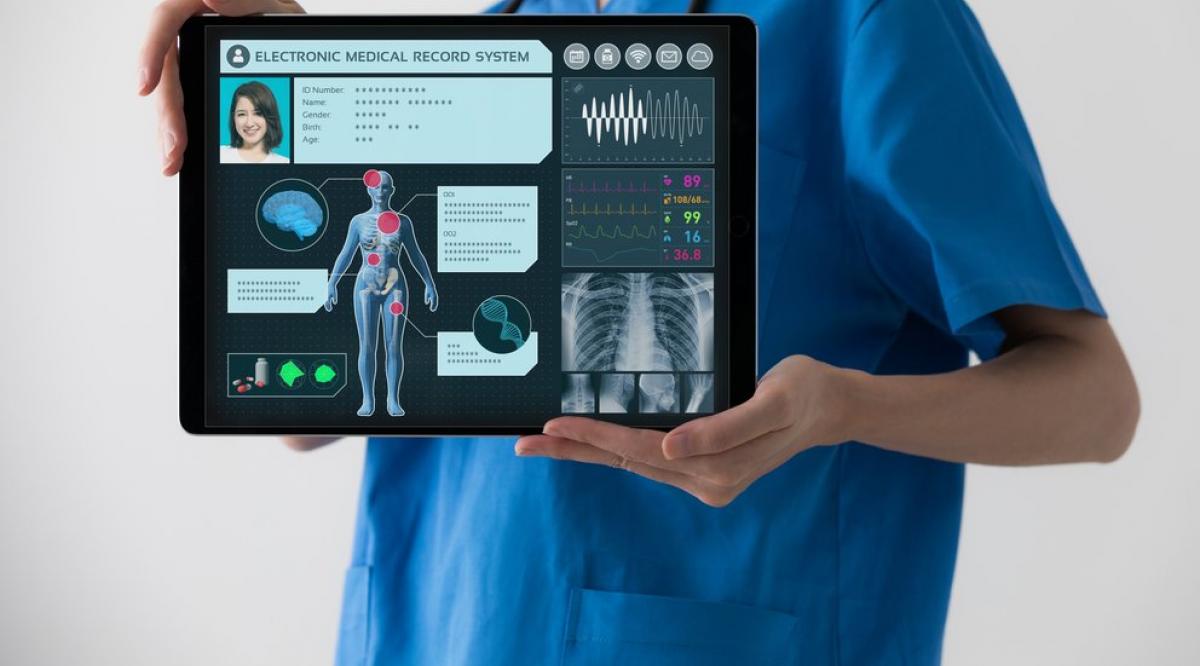An electronic health record (ehr) is the systematized collection of patient and population electronically stored health information in a digital format. these records can be shared across different health care settings. records are shared through network-connected, enterprise-wide information systems or other information networks and exchanges. ehrs may include a range of data, including. Electronic health records (ehrs) are consistently used by external organizations to track the quality of care provided based on the information documented in the medical record, which affects hospital accreditation and reimbursement. 1 however, there's concern that technology may cause some patients to feel as if nurses and other practitioners are documenting for the institution instead of caring for them. 1 therefore, with the integration of bedside nursing and ehrs, nurses must understand. Plano, tx / accesswire / april 8, 2021 / idocsweb, the developer and distributor of a proprietary telemedicine platform targeted specifically for long term care, makes a vast improvement in remote treatment by partnering with the leader in ltc electronic health records vendor,. Epic is a fully integrated, cms-certified electronic medical record (emr) system and is the most widely used emr in the us. to date, more than 50 percent of the us population have their medical records in epic. more than 1,800 of our physicians throughout colorado, wyoming and nebraska utilize uchealth’s shared ambulatory patient record in epic.
Nov 02, 2020 · after several months-long delays, the department of veterans affairs has announced a major milestone in adopting a new electronic health records system: the launch of the cerner millennium ehr at. The adoption electronic medical records used in healthcare of electronic health records, or ehrs, has risen dramatically in u. s. medical facilities. according to the office of the national coordinator for health information technology basic ehr systems had been adopted by 83. 8% of nonfederal acute care hospitals as of 2015, compared to just 9. 4% in 2008. Electronic health records (ehrs) can improve the quality and safety of health care. the adoption and effective use of health information technology can: help reduce medical errors and adverse events. enable better documentation and file organization.
Electronic medical records/electronic health records (emrs/ehrs) percent of office-based physicians using any emr/ehr system: 85. 9%. percent of office-based physicians with a certified emr/ehr system: 79. 7%. Sep 25, 2019 · however, to aid physicians with medical diagnoses, electronic health records could also draw on machine-learning techniques that were developed for recommending films or consumer products. Some people use the terms “electronic medical record” and “electronic health record” (or “emr” and “ehr”) interchangeably. but here at the office of the national coordinator for health information technology (onc), you’ll notice we use electronic health record or ehr almost exclusively.
The Billionaire Who Controls Your Medical Records

Electronic Health Records Cms

Though the technology has been around for roughly 30 electronic medical records used in healthcare years, physicians making the move from paper to electronic medical records may still face some challenges — particularly when it comes to. An electronic health record (ehr) is a digital version of a patient’s paper chart. ehrs are real-time, patient-centered records that make information available instantly and securely to authorized users. while an ehr does contain the medical and treatment histories of patients, an ehr system is built to go beyond standard clinical data collected in a provider’s office and can be inclusive. Methods: literature search based on "electronic health record", "medical record", and "medical chart" using medline, google, wikipedia medical, and cochrane libraries resulted in an initial review of 2,356 abstracts and other information in papers and books. additional papers and books were identified through the review of references cited in.
What Is An Electronic Health Record Ehr Healthit Gov
2 days ago · electronic medical records software (emr), often used interchangeably with electronic health records software (ehr), is a collection of features and tools that allow medical providers to create, store, and update patients' digital health records more easily and more securely than paper charts. What is an electronic medical record (emr)? an electronic medical record (emr) is a digital version of the traditional paper-based medical record for an individual. the emr represents a medical record within a single facility, such as a doctor's office or a clinic. there are a number of different types of digitized health records that contain. An electronic health record (ehr) is an electronic version of a patients medical history, that is maintained by the provider over time, and may include all of the key administrative clinical data relevant to that persons care under a particular provider, including demographics, progress notes, problems, medications, vital signs, past medical history, immunizations, laboratory data and radiology reports the ehr automates access to information and has the potential to streamline the clinician. Researchers can't tap into the promise of ehrs for trans and gender diverse populations because data doesn't always reflect their identities.
With a universal electronic medication record, the guesswork can be removed and many of adverse drug events prevented. Electronichealthrecords (ehrs) can improve the quality and safety of health care. the adoption and effective use of health information technology can: non-msa 50. 3 63. 8 57. 5 66. 9 key: msa = metropolitan statistical area. source: electronic medical records used in healthcare health information national trends survey. iterations included in.
An electronic health record (ehr) is a digital version of a patient’s paper chart. ehrs are real-time, patient-centered records that make information available instantly and securely to authorized users. while an ehr does contain the medical and treatment histories of patients, an ehr system is built to go beyond standard clinical data collected in a provider’s office and can be inclusive of a broader view of a patient’s care. An electronic health record (ehr) is an electronic version of a patients medical history, that is maintained by the provider over time, and may include all of the key administrative clinical data relevant to that persons care under a particular provider, including demographics, progress notes, problems, medications, vital signs, past medical.
Epic systems founder judy faulkner built an empire pioneering—and later dominating—electronic medical records. for decades, she's kept them walled off from competitors, but now the pandemic is fueling a digital health care race that might finally topple her from the throne. Electronic medical records may include access to personal health records (phr) which makes individual notes from an emr readily visible and accessible for consumers. [ citation needed ] some emr systems automatically monitor clinical electronic medical records used in healthcare events, by analyzing patient data from an electronic health record to predict, detect and potentially prevent.
The study is only open to patients who use android devices. in a statement of tech giants including google try and fail to create new versions of the electronic health record (ehr). looking forward, he hopes to see more companies take a similar. The group will gain visibility into their practice to allow them to grow the practice while providing an easy to use tool for practitioners visit thesnfist. com/electronic-health-records/. about saisystems health saisystems health is a division. In their findings, published online on jan. 9, 2021, in the journal drug and alcohol dependence, the researchers conclude that electronic health records are less commonly used by substance use. Electronichealthrecords (ehrs) have emerged among health information technology as "meaningful use" to improve the quality and efficiency of healthcare, and health disparities in population health. in other instances, they have also shown lack of interoperability, functionality and many medical er.
Figure. electronic health records (ehrs) are consistently used by external organizations to track the quality of care provided based on the information documented in the medical record, which affects hospital accreditation and reimbursement. 1 however, there's concern that technology may cause some patients to feel as if nurses and other practitioners are documenting for the institution. Ehr (electronic health record) should not be confused with emr about paying for features and options you'll never need to use. deployment is easy and the cloud-based interface is simple. A study at two urgent care clinics found that adopting a new electronic health records system doubled the "after two and a half years of continuous use, clinicians' electronic medical records used in healthcare cognitive workload remained.
